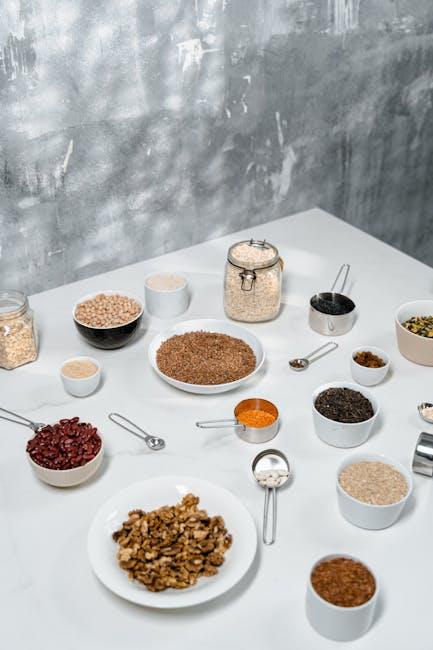Embarking on a ketogenic journey can feel like stepping into a whole new world—one where carbs take a backseat and healthy fats steal the spotlight. Whether you’re a seasoned keto enthusiast or just starting to explore this low-carb lifestyle, having the right ingredients at your fingertips is key to success. Enter the ultimate keto grocery shopping list: your trusty roadmap to navigating grocery aisles with confidence and ease. This carefully curated collection of must-have foods will simplify meal planning, fuel your body, and keep you on track—turning every shopping trip into a satisfying step toward your health goals.
Table of Contents
- Keto Pantry Essentials for Effortless Meal Prep
- Fresh Produce that Boosts Keto Nutrition
- Choosing the Right Proteins for a Balanced Keto Diet
- Must-Have Fats and Oils to Elevate Your Recipes
- Smart Snacks and Treats to Keep Cravings in Check
- Q&A
- Key Takeaways

Keto Pantry Essentials for Effortless Meal Prep
Stocking your pantry with the right ingredients is key to making keto meal prep both simple and satisfying. Healthy fats like coconut oil, olive oil, and avocado oil form the backbone of almost every keto recipe, enhancing flavor and keeping you full longer. Don’t overlook nut and seed flours such as almond and coconut flour; these are essential for low-carb baking and coating your favorite proteins. To keep meals quick and varied, keep a stash of canned sardines, olives, and pickles on hand—they provide a punch of flavor and convenience that’s perfect for last-minute additions.
Keeping your recipes flavorful and diverse is effortless when you include a variety of shelf-stable herbs, spices, and condiments. Essentials like smoked paprika, garlic powder, and dried oregano bring aromatic depth to dishes without adding carbs. In the spice rack, ground turmeric and cinnamon are also powerhouse ingredients that add both taste and antioxidant benefits. To keep track of your essential pantry items, here’s a quick reference:
| Category | Examples | Benefits |
|---|---|---|
| Oils & Fats | Coconut oil, Olive oil, Avocado oil | High-quality fats for cooking and dressings |
| Flours & Coatings | Almond flour, Coconut flour, Pork rinds | Low-carb alternatives for breading and baking |
| Proteins & Snacks | Canned sardines, Almonds, Beef jerky | Convenient and keto-friendly protein sources |
| Herbs & Spices | Garlic powder, Smoked paprika, Turmeric | Boosts flavor without carbs |
Fresh Produce that Boosts Keto Nutrition
When it comes to enriching a ketogenic diet with fresh produce, focusing on low-carb, nutrient-dense vegetables and fruits is key. These options not only keep your carb count in check but also deliver essential vitamins, minerals, and fibers that support overall health and energy. Think vibrant leafy greens like spinach, kale, and arugula which are all packed with antioxidants and virtually carb-free. Incorporating crunchy delights such as celery, cucumbers, and zucchini adds satisfying texture without compromising your macro goals. Meanwhile, small portions of berries like raspberries and offer a naturally sweet treat with minimal impact on ketosis.
Below is a simple guide to fresh produce choices optimized for keto nutrition. Use this as a reference to balance your meals with flavorful, antioxidant-rich options that complement higher-fat staples. Fresh herbs such as basil and cilantro can also transform dishes, adding depth without unnecessary carbs or calories.
| Vegetable/Fruit | Net Carbs (per 100g) | Key Nutrients |
|---|---|---|
| Spinach | 1.4g | Iron, Vitamins A & C |
| Zucchini | 2.1g | Vitamin C, Potassium |
| Raspberries | 5.4g | Fiber, Vitamin C |
| Celery | 1.8g | Vitamin K, Folate |
| Kale | 3.6g | Vitamins A, K, Calcium |
Choosing the Right Proteins for a Balanced Keto Diet
When selecting proteins for your keto journey, focus on sources that are rich in healthy fats and low in carbs to maintain ketosis while supporting your overall health. Opt for grass-fed meats, wild-caught fish, and pasture-raised poultry to ensure you’re getting the best quality. These options not only provide essential amino acids but also contain beneficial omega-3 fatty acids that promote heart health and reduce inflammation. Incorporate a variety of cuts such as ribeye, thighs, and salmon fillets to keep your meals exciting and nutritionally balanced.
Don’t overlook plant-based proteins like tofu and tempeh, which can be fantastic additions for keto dieters seeking diversity or vegetarian alternatives. Additionally, including eggs and full-fat dairy products like cheese and Greek yogurt adds versatility to your protein intake. Here’s a quick glance at some keto-friendly proteins:
- Beef: Ribeye, ground beef, brisket
- Poultry: Chicken thighs, duck, turkey
- Seafood: Salmon, sardines, mackerel
- Plant-Based: Tofu, tempeh
- Dairy & Eggs: Cheddar, cream cheese, pasture-raised eggs
| Protein Source | Carbs (per 100g) | Fat (per 100g) | Ideal For |
|---|---|---|---|
| Grass-fed Ribeye | 0g | 20g | High-fat keto meals |
| Wild-Caught Salmon | 0g | 12g (Omega-3 rich) | Heart health support |
| Pasture-Raised Eggs | 1g | 10g | Versatile & keto staples |
| Tofu | 2g | 5g | Vegetarian keto options |
Must-Have Fats and Oils to Elevate Your Recipes
When it comes to crafting mouthwatering keto dishes, the quality and variety of fats and oils you choose make all the difference. Prioritize fats that not only boost flavor but also support ketosis and overall health. Extra virgin olive oil is a kitchen staple, excellent for drizzling over salads or sautéing vegetables, thanks to its rich, fruity notes and antioxidant properties. For higher-heat cooking, opt for avocado oil, which boasts a high smoke point and mild taste. Don’t overlook the creamy goodness of coconut oil, perfect for adding a tropical twist to your recipes while delivering medium-chain triglycerides that may enhance fat burning.
To maintain balance and sophistication in your culinary creations, diversify your fat sources. Incorporate grass-fed butter or ghee to introduce a nutty depth to sauces and roasted veggies. Meanwhile, nut and seed oils, such as macadamia nut oil and flaxseed oil, provide unique flavors and essential fatty acids, though the latter should be used cold to preserve its benefits. Below is a handy overview summarizing these keto-friendly fats to keep your pantry perfectly stocked:
| Fat/Oil | Best Use | Key Benefit |
|---|---|---|
| Extra Virgin Olive Oil | Salads, Low-Heat Cooking | Rich in antioxidants |
| Avocado Oil | High-Heat Cooking | High smoke point |
| Coconut Oil | Baking, Tropical Flavoring | Contains MCTs for energy |
| Grass-Fed Butter/Ghee | Sautéing, Roasting | Buttery depth and vitamins |
| Flaxseed Oil | Dressings (Cold Use) | Rich in omega-3 fatty acids |
Smart Snacks and Treats to Keep Cravings in Check
When hunger strikes between meals, reaching for the right snack can make all the difference. Opt for high-fat, low-carb treats that fuel your ketosis without spiking blood sugar levels. Think crunchy pork rinds, a small handful of macadamia nuts, or slices of creamy avocado sprinkled with sea salt. These options provide satisfying textures and flavors that keep your palate engaged while helping you avoid the common pitfalls of carb-heavy snacking.
For easy access and variety, stock your pantry with keto-friendly snack staples. Here’s a quick reference to keep you on track:
| Snack | Key Benefit | Carbs (per serving) |
|---|---|---|
| Cheese Crisps | Crunchy & protein-rich | 1g |
| Olives | Healthy fats & antioxidants | 1g |
| Nut Butter (Almond/Cashew) | Creamy & satiating | 2g |
| Celery with Cream Cheese | Low-calorie & fiber-packed | 2g |
Q&A
Q: What is the Ultimate Keto Grocery Shopping List?
A: The Ultimate Keto Grocery Shopping List is a comprehensive guide to essential low-carb, high-fat foods tailored to support a ketogenic lifestyle. It simplifies keto shopping by highlighting the best ingredients that keep you in ketosis while ensuring variety and nutrition.
Q: Why is having a specialized keto grocery list important?
A: Keto requires a careful balance of fats, proteins, and very low carbs. A specialized list helps prevent impulse buys of high-carb foods, keeps your diet on track, and saves time by focusing on keto-friendly staples that fuel your body efficiently.
Q: Which food groups are prioritized on the Ultimate Keto Grocery List?
A: The list prioritizes healthy fats (avocados, olive oil, butter), moderate proteins (meats, eggs, cheese), and low-carb vegetables (leafy greens, cauliflower). It also includes nuts, seeds, and keto-approved condiments to add flavor and texture without the carbs.
Q: Can I find keto alternatives for common high-carb foods?
A: Absolutely! The list often features keto substitutes like cauliflower rice instead of white rice, zucchini noodles in place of pasta, and almond or coconut flour rather than wheat flour—helping you recreate favorite meals with a keto twist.
Q: How does the Ultimate Keto Grocery Shopping List help newcomers?
A: For beginners, the list provides clarity and direction, helping them navigate the often confusing world of keto foods. It reduces overwhelm, making grocery shopping straightforward and sets them up for success by stocking the most effective foods for ketosis.
Q: Are snacks included in the Ultimate Keto Grocery List?
A: Yes, keto-friendly snacks such as cheese sticks, nuts, olives, and pork rinds are included. These options help curb hunger between meals without kicking you out of ketosis.
Q: What should I avoid when following the Ultimate Keto Grocery List?
A: To stay in ketosis, avoid foods high in sugars and starches like bread, pasta, potatoes, and most processed snacks. The list helps identify these pitfalls, guiding you toward healthier, fat-centric alternatives instead.
Q: How often should I update my keto grocery list?
A: It’s a good idea to revisit and adjust your list periodically based on seasonal produce, personal preferences, and dietary responses to ensure variety and continued enjoyment of your meals. Staying flexible keeps your keto journey sustainable.
Q: Can the Ultimate Keto Grocery Shopping List accommodate food allergies or preferences?
A: Yes, the list can be customized to suit allergies (like dairy or nuts) and preferences by swapping out certain items for keto-friendly alternatives, ensuring everyone can maintain a satisfying and safe keto diet.
Q: Where can I find the Ultimate Keto Grocery Shopping List?
A: Many keto blogs, nutrition websites, and health apps provide downloadable or printable versions of the list. Some even offer meal plans and recipes to accompany your shopping, making keto eating even easier to embrace.
Key Takeaways
As you embark on your keto journey armed with this ultimate grocery shopping list, remember that the key to success lies not just in the items you choose, but in how you embrace the lifestyle. Let this list be your trusty companion, guiding your trips to the store with confidence and clarity. Whether you’re stocking up on healthy fats, fresh veggies, or quality proteins, each item brings you one step closer to your goals. Here’s to mindful shopping, delicious meals, and a vibrant keto experience—happy shopping!

